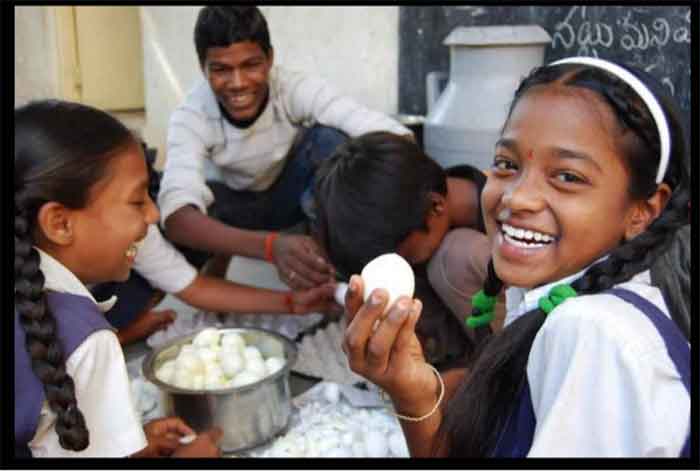
On November 23 2021, in the context of serious malnutrition, the Government of Karnataka announced that eggs would be provided three days a week as part of the mid-day meal scheme, to students in seven districts, namely, Bidar, Raichur, Kalaburagi, Yadgir, Koppal, Ballari and Vijayapura. This move was welcomed by activists and nutritionists who also insisted that eggs be extended to 5 days of the week and in all districts of the state. Eggs can also meet the National Food Security 2013 mandate as each 60 gm egg can provide almost ½ the protein requirement of each meal (12 – 20 gm of good quality protein) as well as many other essential nutrients. Shockingly, in stark contrast there have been objections raised by the All India Vegetarian Federation along with other Lingayat and Jain religious leaders, against the distribution of eggs, purely for religious reasons. An earlier attempt in 2015 for eggs in Karnataka had been similarly clamped down by various religious groups.
The Right to Food Campaign demands that the government of Karnataka, as well as other States, base their nutritional interventions for children on sound scientific premise rather than religion, caste or ideology. Scientific basis of nutrition intervention will also send out an important message to children and communities about healthy eating and nutrient dense foods. Eggs have to be offered to all children as part of the mid day meal scheme in government/government aided schools as well as anganwadis, with alternatives like an additional glass of milk, a bowl of curd or a fruit offered to those children who cannot eat eggs.
As per National Institute of Nutrition (NIN) and demands from civil society, nutritionists, doctors, advocates, parents, children etc., eggs should be provided as part of mid-day meals on 5 days of the week to children owing to its numerous nutritional benefits. Karnataka has been the only South Indian state that has not provided eggs as part of MDM, in spite of the fact that 94% students in the government and aided schools belong to communities that eat eggs. According to the National Family Health Survey-4 (2015-16) at least 83% of the state’s population does not have any cultural or religious objections to consuming eggs. States like Tamil Nadu and Andhra Pradesh with budgets comparable to Karnataka provide eggs 5 times a week.
According to the National Family Health Survey (NFHS) 5th round (2019), most children in Karnataka do not reach their ideal height and weight. Stunting (less height for age) of 35.4% and being underweight (less weight for age) of 32.9% are common in children even before they start their school life, and this is much more so in children from vulnerable communities. We are concerned that these indicators would have worsened considerably due to the pandemic and lockdown.
One must recognize that the problem is not just the absence of eggs from the menu at schools and anganwadis. The menu lacks diversity in the form of milk, dairy, vegetables, fats/oils, pulses and legumes in many of the States. The prevalence of nutritional deficiency, stunting, underweight and other kinds of health issues is higher in the children belonging to marginalized communities. Due to the vicious combination of malnutrition and illness, the children and families of these communities are the most vulnerable without the intervention of the state. Eggs in these scenarios can tilt the nutritional status of a child and would help gaining essential nutrients in fighting malnutrition and ill health conditions. Eggs provide many of the nutritional needs including good quality proteins, minerals, vitamins and fats. They are easy to cook, not prone to adulteration and pilferage like other foods and contribute to increasing school attendance.
Education and child health simultaneously plays a crucial role in poverty reduction and economic development. Mid-day meal programmes which include meals served to children in schools are important means of improving school participation while fostering, learning and supplementing the inadequate diets of school age children. The nutritional impact under government’s programmes can be positive to a great extent depending on the quality and quantity of food provided.
We demand that the government urgently take following measures:
- Eggs should be provided on five days of the week to the children who eat eggs in every state of the country. Those who don’t can be offered a fruit, curd or a glass of milk. The contract for the supply of eggs should be given to local self-help or women’s groups to support the livelihood of communities as well.
- Milk or milk powder should be provided to school-children daily. Milk powder should be reconstituted at the school and provided fresh to the children. Under no circumstances should the milk be reconstituted and then transported as happens with centralized kitchens.
- Extra effort has to go to ensure that children in tribal belts, dalit children, children from OBC communities are not left out.
- School-based kitchens should be set up in all schools. All centralized contracts should be canceled immediately.
- The focus should move from cereals/millets and fortification to a more diverse and nutrient dense diet.
- To provide all the above said entitlements state as duty bearer must enhance the unit cost of the nutritional meal.
- Health check-ups to be organized for all school children in the state immediately through the health department/PHCs. Regular health tracking of children to be done with help of the health department, along with the provision of deworming, iron tablets etc.
Sincerely,
Gangaram Paikra, Aysha, Kavita Srivastava, Dipa Sinha, Anuradha Talwar, Mukta Srivastava, Amrita Johri
(On behalf of the Right to Food campaign)
Related posts:
Related posts:
Views: 0
 RSS Feed
RSS Feed

















 December 21st, 2021
December 21st, 2021  Awake Goy
Awake Goy  Posted in
Posted in  Tags:
Tags: 
















